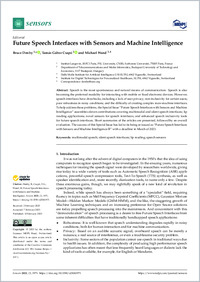Future speech interfaces with sensors and machine intelligence
- Denby, Bruce Institut Langevin, ESPCI Paris, PSL University, CNRS, Sorbonne Université, Paris, France
- Csapó, Tamás Gábor Department of Telecommunications and Media Informatics, Budapest University of Technology and Economics, Hungary
- Wand, Michael ORCID Istituto Dalle Molle di studi sull'intelligenza artificiale (IDSIA), Facoltà di scienze informatiche, Università della Svizzera italiana, Svizzera - Institute for Digital Technologies for Personalized Healthcare, SUPSI, Viganello, Switzerland
- 2023
Published in:
- Sensors . - 2023, vol. 23, no. 4, p. 1971
English
Speech is the most spontaneous and natural means of communication. Speech is also becoming the preferred modality for interacting with mobile or fixed electronic devices. However, speech interfaces have drawbacks, including a lack of user privacy; non-inclusivity for certain users; poor robustness in noisy conditions; and the difficulty of creating complex man–machine interfaces. To help address these problems, the Special Issue “Future Speech Interfaces with Sensors and Machine Intelligence” assembles eleven contributions covering multimodal and silent speech interfaces; lip reading applications; novel sensors for speech interfaces; and enhanced speech inclusivity tools for future speech interfaces. Short summaries of the articles are presented, followed by an overall evaluation. The success of this Special Issue has led to its being re-issued as “Future Speech Interfaces with Sensors and Machine Intelligence-II” with a deadline in March of 2023.
- Collections
- Language
-
- English
- Classification
- Computer science and technology
- License
- Open access status
- gold
- Identifiers
-
- DOI 10.3390/s23041971
- ARK ark:/12658/srd1332077
- Persistent URL
- https://n2t.net/ark:/12658/srd1332077
Statistics
Document views: 63
File downloads:
- Wand_2023_MDPI_sensors_Future Speech Interfaces: 32
